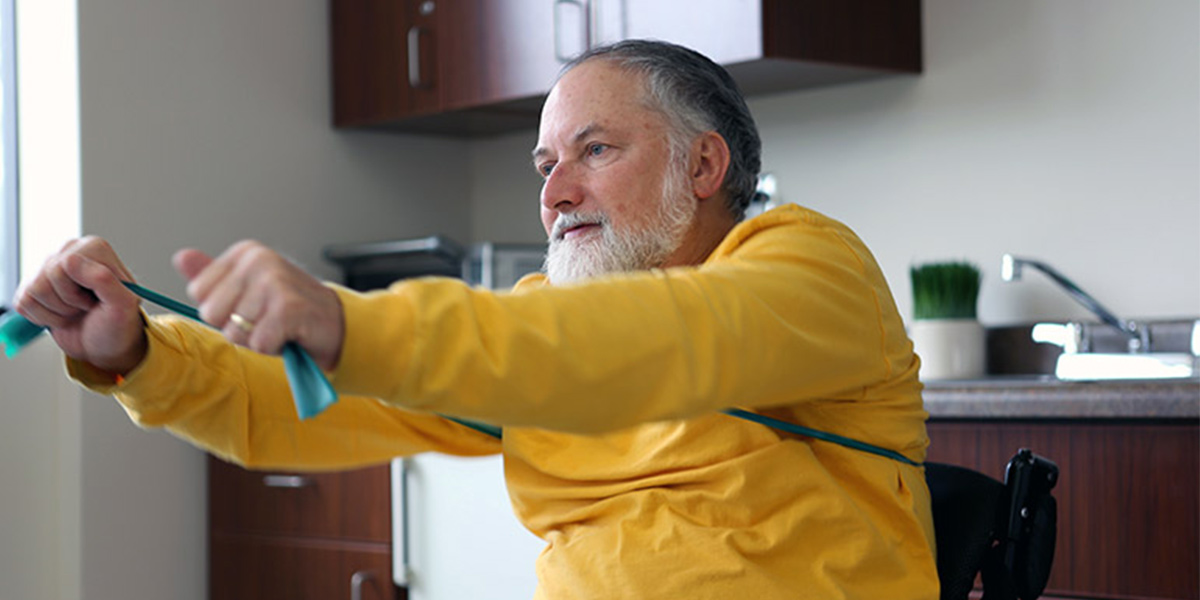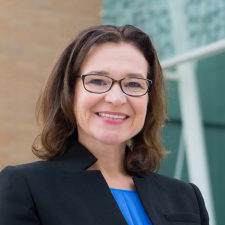
For many people, staying active during COVID-19 isolation can be a struggle. This can be even more challenging for people living with disabilities, says UBC professor Dr. Kathleen Martin Ginis.
Dr. Martin Ginis is the director of the UBC Faculty of Medicine Centre for Chronic Disease Prevention and Management, a professor in the department of medicine and UBC Okanagan’s School of Health and Exercise Sciences. She’s also the director of the Canadian Disability Participation Project (CDPP), a group that has revived a service called Get in Motion to support people with disabilities to get regular physical activity.
Get in Motion was a phone-in coaching service led by Dr. Martin Ginis’s lab, but put on hold a few years ago. Now, with people self-isolating, there is a push from public health authorities for people to get a daily dose of physical activity. However, Dr. Martin Ginis and her colleagues from Queen’s University, Amy Latimer-Cheung and Jennifer Tomasone, say Canadians with disabilities have fewer options than others to get exercise.

Dr. Kathleen Martin Ginis
“People with a disability are at increased risk for social isolation under ‘usual’ circumstances, but especially so during the COVID outbreak,” says Dr. Martin Ginis. “They also face unique barriers and challenges to physical activity. With the closure of adapted physical activity and recreation programs, we are very concerned about the health and well-being of Canadians with disabilities. We are offering the Get in Motion service as a way to manage some of the psychosocial and physical health risks of being inactive at home.”
Dr. Martin Ginis explains that adapted sport and exercise programs were closed across the country because of COVID-19.
“We had been talking to our community partners who were closing their programs and we were all feeling upset about the impact these closures will have on community members with disabilities,” she says. “We were all thinking, ‘I wish we still had Get in Motion,’ and then Amy Latimer-Cheung started the ball rolling and got the service back up and running.”
“We are offering the Get in Motion service as a way to manage some of the psychosocial and physical health risks of being inactive at home.”
Dr. Kathleen Martin Ginis, director of the UBC Faculty of Medicine Centre for Chronic Disease Prevention and Management
Based virtually out of Latimer-Cheung and Tomasone’s lab at Queen’s, Get in Motion is available for all Canadians with physical disabilities, as well as for Special Olympics athletes. Participants can connect with a volunteer physical activity coach via phone or online conferencing. The volunteer then guides that person through an at-home physical activity program.
The CDPP is based out of UBCO and Dr. Martin Ginis has several students actively counselling Get in Motion participants while others are being trained.
Get in Motion volunteer Sarah Lawrason is a second-year doctoral student who studies physical activity participation among people with spinal cord injuries who walk. She was matched with someone who fits into her research population.
“My client lost access to her regular physiotherapy when COVID-19 happened. We talk once a week about her exercise goals,” says Lawrason. “She appreciates the accountability of checking in and setting a goal each week and she’s enjoyed the resources I’ve sent her that have similar exercises to her normal routine.”
Lawrason notes, however, this is definitely a two-way relationship where both the coach and the client are benefitting.
“Initially, I was really excited to start coaching as it aligns with my own research,” she says. “But I also really look forward to my calls each week because it’s a new friendly person to talk to when I’m feeling isolated.”
The CDPP has documented data about the benefits of sport and exercise participation for Canadians with disabilities including improved health, well-being and overall life satisfaction.
“Our research has shown that a sense of belonging is key to people with disabilities experiencing ‘full and effective participation’ in sport and exercise,” says Dr. Martin Ginis. “With Get in Motion, we are striving to provide that sense of belonging through phone calls with trained volunteers who have experience with adapted sport and exercise. Because the belongingness piece is removed if you are doing this all alone.”
For more information about the Get in Motion, or to enrol in the program, visit: cdpp.ca/get-involved
A version of this story originally appeared on the UBC Okanagan website.